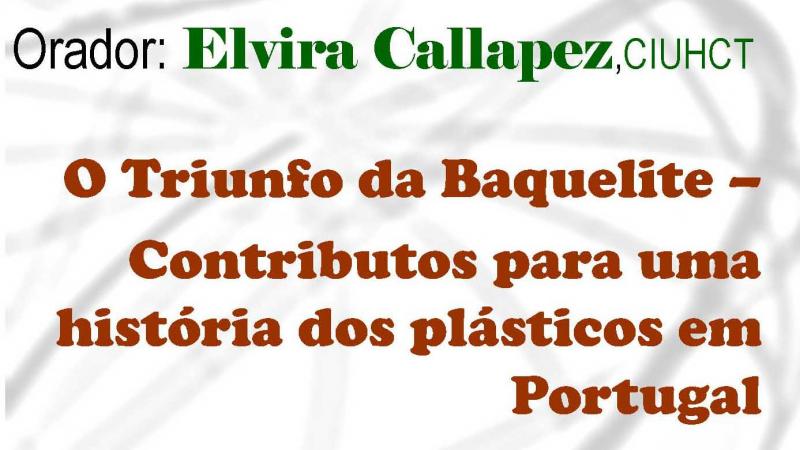
Nesta primeira Conferência CIUHCT de 2016, a investigadora Elvira Callapez apresenta a sua investigação sobre a história tecnocientífica, industrial e social dos plásticos e o seu impacto na sociedade desde 1910, tendo por base o artigo que escreveu com o título "Safeguarding the Plastic´s Heritage".
Sumário do artigo (em inglês):
Plastics, initially conceived as products to replace and imitate natural materials, acquired such a degree of development that there is practically no field of activity where they are not employed. In competition with traditional materials (metals, wood, ceramics, wool, etc.), plastics soon attained a prominent position due to their characteristics and the pace at which better materials, processes and new applications were developed. This development was not only the result of advancements in science and technology, but also a contribution to the progress of these areas. The need to solve problems through the development of plastics, as well as achieve materials with certain characteristics has led to research that led to advances in other areas of science and technology. As a consequence, the plastics industry has come to occupy a prominent place in the economies of industrialized countries since the inter-war period until the present day.
The paper will reflect on how this development should be put on display in museums with important collections of plastics objects. Starting with Bakelite, mass consumption of plastics products emerged, that later was taken over by thermoplastics such as polystyrene, polyvinyl chloride, polyethylene, ´acrylics`, and ´Teflon`. After World War II, many first-generation objects eventually disappeared, so it is therefore important to collect and preserve them, and put them on display.
Special attention will be devoted to some Portuguese collections of materials. Baquelite Liz, for instance, a Portuguese company that has worked in this area since 1940 in Leiria, the birthplace of the plastics manufacturing industry, has a wonderful collection that can serve as the basis for a future museum.
Bio:
Maria Elvira Callapez holds a B. Sc. in Applied Chemistry, Branch: Organic Chemistry, and a M. Sc. in History and Philosophy of Science, and PhD in History and Philosophy of Science. Her PhD thesis was on Technology Transfer – The Introduction in Portugal of PVC Industry by CIRES. From 2004 to 2007 she was a Post Doc at University of California, Berkeley (UCB) in the Office for History of Science & Technology, on the analysis of the prohibition of substances used by the plastics industry, namely the use of phthalates in the production of toys made of PVC for babies and children under 5 years of age. Her research interests and publications focus on the history of chemical engineering teaching in Portugal, material culture studies, history of plastics in Portugal, technology transfer and environmental regulation. She has been working with elementary and high school teachers on science education projects. She has been member of executive committee of ICOHTEC, since 2011. Currently she is a visiting scholar at UCB, and a research fellow at Centro Interuniversitário de História da Ciência e Tecnologia.
Outras informações:
Os plásticos, inicialmente concebidos como produtos destinados a imitar ou substituir os materiais naturais, adquiriram um tal grau de desenvolvimento que já não há praticamente nenhum campo de atividade onde não sejam empregues. Em competição com os materiais tradicionais (metais, madeira, cerâmica, lã, etc.), os plásticos rapidamente atingiram uma posição de proeminência devido às suas características e ao ritmo ao qual melhores materiais, processos e aplicações foram desenvolvidos.

